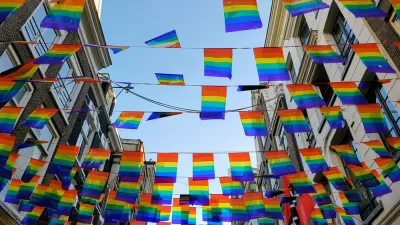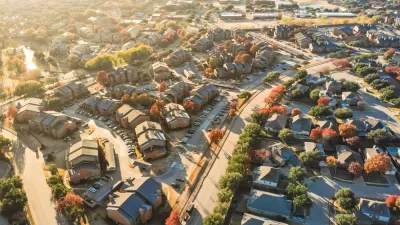LGBTQ elders are more likely than their age-peers to have experienced discrimination, leaving them more likely to be poor and have chronic health problems. LGBTQ-friendly senior housing aims to provide a safe and supportive place to age.

For 20 years Marti Smith lived in an apartment in a fairly upscale neighborhood on the north side of Chicago. Smith loved her home—it was affordable, had three bedrooms, and a backyard where she could garden. Her landlord even allowed her to mow the lawn and shovel snow in order to keep the rent down. But over the years, the area began to change and home prices increased dramatically, making it difficult for locals—especially those on fixed incomes—to find housing they could afford.
The apartment building where Smith lived was eventually sold, and Smith, who at the time was in her late 60s and retired, had to find someplace else to call home. A self-described “card-carrying lesbian,” Smith knew it wasn’t going to be easy to find a place where she could live comfortably and be herself, without judgment. As luck would have it, Chicago’s first LGBTQ-welcoming, 100 percent affordable housing residence was accepting applications. Town Hall Apartments, a 79-unit building, opened in 2014 and Smith has been living there ever since.
While she misses her garden, and she tends to be a person who sees her glass half empty, Smith knows she’s one of the lucky ones. LGBTQ seniors are far more likely to face poverty and homelessness because of discrimination—48 percent of older same-sex couples have experienced discrimination when seeking housing, according to a 2014 Equal Rights Center study. And due to sometimes-rampant homophobia in retirement communities, it’s not uncommon for LGBTQ elders to hide their sexual preference and gender identities, Smith says. Those settings contribute to social isolation, which is deadly.
The LGBTQ senior population—estimated at 3 million strong in the U.S.—have contended with a lifetime of insufficient legal protections, and racial and gender disparities. LGBTQ older adults also experience serious health issues, like higher blood pressure rates and earlier onset of disabilities, according to a report by the Kaiser Family Foundation.
And the community is only growing. It’s expected that the LBGT senior population will grow to 7 million—double the size of Chicago—by 2030.
In recent years, LGBT-friendly affordable housing residences like Town Hall Apartments have been popping up in major cities across the country—from Philadelphia to San Francisco. At present there are about 12 developments in the U.S. that account for almost 1,100 units of affordable housing geared toward LGBTQ elders, according to SAGE, an advocacy and services organization for LGBTQ elders. Six other developments on the horizon are expected to have 300-plus units, and several more of these types of developments are in the early to mid-planning stages.
How are these units getting built, and what are the obstacles to building more?
....
FULL STORY: Affordable Housing for LGBTQ Seniors

Planetizen Federal Action Tracker
A weekly monitor of how Trump’s orders and actions are impacting planners and planning in America.

Maui's Vacation Rental Debate Turns Ugly
Verbal attacks, misinformation campaigns and fistfights plague a high-stakes debate to convert thousands of vacation rentals into long-term housing.

San Francisco Suspends Traffic Calming Amidst Record Deaths
Citing “a challenging fiscal landscape,” the city will cease the program on the heels of 42 traffic deaths, including 24 pedestrians.

Amtrak Rolls Out New Orleans to Alabama “Mardi Gras” Train
The new service will operate morning and evening departures between Mobile and New Orleans.

The Subversive Car-Free Guide to Trump's Great American Road Trip
Car-free ways to access Chicagoland’s best tourist attractions.

San Antonio and Austin are Fusing Into one Massive Megaregion
The region spanning the two central Texas cities is growing fast, posing challenges for local infrastructure and water supplies.
Urban Design for Planners 1: Software Tools
This six-course series explores essential urban design concepts using open source software and equips planners with the tools they need to participate fully in the urban design process.
Planning for Universal Design
Learn the tools for implementing Universal Design in planning regulations.
Heyer Gruel & Associates PA
JM Goldson LLC
Custer County Colorado
City of Camden Redevelopment Agency
City of Astoria
Transportation Research & Education Center (TREC) at Portland State University
Jefferson Parish Government
Camden Redevelopment Agency
City of Claremont




























